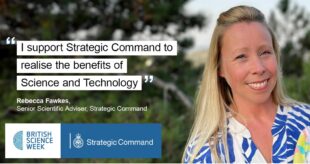Rebecca Fawkes shares how her role as Strategic Command’s Senior Scientific Adviser supports the development and exploitation of game-changing capabilities.

Interviewer: Can you introduce yourself and tell us about your role?
Rebecca: I’m Rebecca Fawkes, I am the Senior Scientific Adviser for Strategic Command, working within Defence Science and Technology (DST).
I’m part of the network of Scientific Advisers embedded across Defence on behalf of the MOD’s Chief Scientific Adviser. We’re here to connect the military with the Science and Technology (S&T) community, providing scientific advice, expertise, and challenge. In Strategic Command, this is across the breadth of our capability, including Defence Digital, Defence Medical Services, Defence Support and Logistics, and Joint Force Development.
We support Strategic Command to realise the benefits from S&T, helping them develop and pull-through technologies from concept to in-service capability and applying research and development, analysis, and experimentation to support their decision-making.
Interviewer: That sounds fascinating, what exactly does it entail?
Rebecca: We do three main things. We connect and communicate, helping to improve Strategic Command’s awareness of the S&T enterprise and its activities, sharing the impact it could have in terms of game-changing capabilities, and facilitating access to the right expertise.
We influence, ensuring that the right research and studies are commissioned and delivered, engaging with the Chief Scientific Adviser’s research portfolio and across the wider S&T network.
Lastly, we support and enable Strategic Command to make evidence-based decisions, capitalise on S&T developments and plan for exploitation.
Within all of this we’re here to provide constructive challenge at every level, ensuring Strategic Command asks the right questions, applies appropriate scientific rigour, and maximises the opportunities that S&T advice and solutions afford.
Interviewer: What do you find most rewarding about your role?
Rebecca: For me it’s engaging directly with the military and being a trusted member of their team, bringing S&T to the table and collaborating across Defence to solve complex problems.
I think that the effective development and exploitation of S&T, including well targeted use of expertise, are absolutely critical to generating an integrated and fully enabled force. As a Scientific Adviser you’re close to the issues, you’re at the heart of generating solutions, and you get to see the immediate impact of good science, how it advances capability, develops the way that the military operates, and improves the safety of those on the frontline through greater evidence and insight, technology options and choice.
Interview: What inspired you to pursue a career in STEM?
Rebecca: I’ve always had an interest in STEM and studied Physical Geography before completing a Masters in Environmental Sciences. I joined the Defence Science and Technology Laboratory (Dstl) after graduating and it opened my eyes to the endless opportunities afforded by S&T in Defence through its diverse and profoundly interesting projects and programmes. I built a varied portfolio of experience in a number of cross-cutting technology and capability areas, which gave me a broad perspective and equipped me well for Scientific Advice in Strategic Command.
Interviewer: What advice would you give to someone looking to enter the STEM field?
Rebecca: There’s so much scope for STEM in Strategic Command and across Defence and wider Government. Sound science underpins much of what we do and is becoming ever more important in an increasingly technological world. Much like my own journey, a strong scientific foundation, which STEM provides, offers you a wealth of opportunities for growth and development, for building expertise beyond your initial technical specialism, and for applying yourself to new challenges that will unfold throughout your career; it keeps things interesting.
Leave a comment